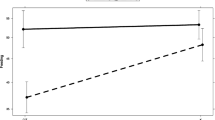Abstract
Fluoxetine (FLX) is a selective serotonin (5-HT) reuptake inhibitor known for its effects modifying aggressiveness, personality traits, and anxiety-like behaviors. The aim of the present study was to evaluate the influence of the acute treatment, by immersion, with FLX on aggressive behavior of resident Brycon amazonicus fish. Fish pretreated with FLX presented an increase in aggressiveness, evidenced by the increase on the number of bites and chases against the intruder and a decrease in latency for the first attack, when compared to control fish. Together with previous studies, these results show the complexity of the neural modulation of the aggressive behavior in fish by 5-HTergic system.



Similar content being viewed by others
References
Abreu MS, Giacomini ACVV, Koakoski G, Piato AL, Barcellos LJG (2016) Evaluating anxiety-like and social behavior in jundiá (Rhamdia quelen). Physiol Behav 160:59–65. doi:10.1016/j.physbeh.2016.04.003
Barbosa Júnior A, Alves FL, Fim Pereira AS, Ide LM, Hoffmann A (2012) Behavioral characterization of the alarm reaction and anxiolytic-like effect of acute treatment with fluoxetine in piauçu fish. Physiol Behav 105(3):784–790. doi:10.1016/j.physbeh.2011.10.007
Beasley CM, Masica DN, Potvin JH (1992) Fluoxetine: a review of receptor and functional effects and their clinical implications. Psychopharmacol 107:1–10
Benus RF, Bohus B, Koolhaas JM, Vanoortmerssen GA (1991) Heritable variation for aggression as a reflection of individual coping strategies. Experientia 47:1008–1019. doi:10.1007/BF01923336
Clotfelter ED, O’Hare EP, McNitt MM, Carpenter RE, Summers CH (2007) Serotonin decreases aggression via 5-HT1A receptors in the fighting fish Betta splendens. Pharmacol Biochem Behav 87:222–231. doi:10.1016/j.pbb.2007.04.018
Dahlbom SJ, Lagman D, Lundstedt-Enkel K, Sundström LF, Winberg S (2011) Boldness predicts social status in zebrafish Danio rerio. PLoS One 6(8):e23565–e23567. doi:10.1371/journal.pone.0023565
Forsatkar MN, Abedi M, Nematollahi MA, Rahbari E (2013) Effect of testosterone and fluoxetine on aggressive behavior of fighting fish, Betta splendens. Int J Aquatic Biol 1(6):289–293
Gillette R (2006) Evolution and function in serotonergic systems. Int Comp Biol 46:838–846
Höglund E, Bakke MJ, Øverli Ø, Winberg S, Nilsson GE (2005) Suppression of aggressive behavior in juvenile Atlantic cod (Gadus morhua) by L-tryptophan supplementation. Aquacult 249:525–531. doi:10.1016/j.aquaculture.2005.04.028
Hseu JR, Lu FI, Su HM, Wang LS, Tsai CL, Hwang PP (2003) Effect of exogenous tryptophan on cannibalism, survival and growth in juvenile grouper, Epinephelus coioides. Aquacult 218:251–263. doi:10.1016/S0044-8486(02)00503-3
Kania BF, Gralak MJ, Wielgozs M (2012) Four-week fluoxetine (SSRI) exposure diminishes aggressive behavior of male siamese fighting fish (Betta splendens). J Behav Brain Sci 2(2):185–190. doi:10.4236/jbbs.2012.22022
Lepage O, Larson ET, Mayer I, Winberg S (2005) Serotonin, but not melatonin, plays a role in shaping dominant–subordinate relationships and aggression in rainbow trout. Horm Behav 48(2):233–242. doi:10.1016/j.yhbeh.2005.02.012
Lynn SE, Egar JM, Walker BG, Sperry TS, Ramenofsky M (2007) Fish on Prozac: a simple, noninvasive physiology laboratory investigating the mechanisms of aggressive behavior in Betta splendens. Adv Physiol Educat 31(4):358–363. doi:10.1152/advan.00024.2007
Maximino C, Silva AWB, Gouveia A Jr, Herculano AM (2011) Pharmacological analysis of zebrafish (Danio rerio) scototaxis. Progg Neuro-psycopharmacol Biol Psych 35(2):624–631. doi:10.1016/j.pnpbp.2011.01.006
McDonald MD, Gonzalez A, Sloman KA (2011) Higher levels of aggression are observed in socially dominant toadfish treated with selective serotonin reuptake inhibitor, fluoxetine. Comp Biochem Physio C Toxicol Pharmacol 153(1):107–112. doi:10.1016/j.cbpc.2010.09.006
Nelson RJ, Chiavegatto S (2001) Molecular basis of aggression. Trends Neurosci 24:713–719. doi:10.1016/S0166-2236(00)01996-2
Neumann ID, Veenema AH, Beiderbeck DI (2010) Aggression and anxiety: social context and neurobiological links. Front Behav Neurosci 4:1–12. doi:10.3389/fnbeh.2010.00012
Øverli Ø, Harris C, Winberg S (1999) Short-term effects of fights for social dominance and the establishment of dominant-subordinate relationships of brain monoamines and cortisol in rainbow trout. Brain Behav Evol 54:263–275. doi:10.1159/000006627
Øverli Ø, Korzan WJ, Larson ET, Winberg S, Lepage O, Pottinger TG (2004) Behavioral and neuroendocrine correlates of displaced aggression in trout. Horm Behav 45(5):324–329. doi:10.1159/000006627
Perreault HAN, Semsar K, Godwin J (2003) Fluoxetine treatment decreases territorial aggression in a coral reef fish. Physiol Behav 79:719–724. doi:10.1016/S0031-9384(03)00211-7
Serra M, Wolkers CPB, Mello, MMM, Urbinati EC (2016). Agonistic trials with mirrors do not elicit the same aggressiveness of a real trial in the matrinxã fish, Brycon amazonicus (Spix & Agassiz, 1929). doi:10.1111/jai.13198
Winberg S, Thörnqvist PO (2016) Role of brain serotonin in modulating fish behavior. Curr Zool 62:1–7. doi:10.1093/cz/zow037
Winberg S, Overli O, Lepage O (2001) Suppression of aggression in rainbow trout (Oncorhynchus mykiss) by dietary L-tryptophan. J Exp Biol 204:3867–3876
Wolkers CPB, Serra M, Hoshiba MA, Urbinati EC (2012) Dietary L-tryptophan alters aggression in juvenile matrinxã Brycon amazonicus. Fish Physiol Biochem 38:819–827. doi:10.1007/s10695-011-9569-x
Wolkers CPB, Serra M, Urbinati EC (2014) The time course of aggressive behavior in juvenile matrinxã Brycon amazonicus fed with dietary L-tryptophan supplementation. J Fish Biol 84(1):45–57. doi:10.1111/jfb.12252
Author information
Authors and Affiliations
Corresponding author
Rights and permissions
About this article
Cite this article
Wolkers, C.P.B., Serra, M., Barbosa Júnior, A. et al. Acute fluoxetine treatment increases aggressiveness in juvenile matrinxã (Brycon amazonicus) . Fish Physiol Biochem 43, 755–759 (2017). https://doi.org/10.1007/s10695-016-0329-9
Received:
Accepted:
Published:
Issue Date:
DOI: https://doi.org/10.1007/s10695-016-0329-9




